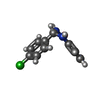+ Open data
Open data
- Basic information
Basic information
| Entry |  Database: PDB chemical components / ID: NKI Database: PDB chemical components / ID: NKI |
|---|---|
| Name | Name: ( |
-Chemical information
| Composition |  | ||||
|---|---|---|---|---|---|
| Others | Type: NON-POLYMER / PDB classification: HETAIN / Three letter code: NKI / Ideal coordinates details: Corina / Model coordinates PDB-ID: 5AKW | ||||
| History |
| ||||
 External links External links |  UniChem / UniChem /  ChemSpider / ChemSpider /  Nikkaji / Nikkaji /  PubChem / PubChem /  ZINC / ZINC /  Wikipedia search / Wikipedia search /  Google search Google search |
- Structure visualization
Structure visualization
| Structure viewer | Molecule:  Molmil Molmil Jmol/JSmol Jmol/JSmol |
|---|
-Details
-SMILES
| CACTVS 3.385 | | OpenEye OEToolkits 1.7.6 | |
|---|
-SMILES CANONICAL
| CACTVS 3.385 | | OpenEye OEToolkits 1.7.6 | |
|---|
-InChI
| InChI 1.03 |
|---|
-InChIKey
| InChI 1.03 |
|---|
-SYSTEMATIC NAME
| OpenEye OEToolkits 1.7.6 | ( |
|---|
-PDB entries
Showing all 1 items

PDB-5akw: 
Crystal structure of TNKS2 in complex with 2-(4-chlorophenyl)-1,2,3,4- tetrahydroquinazolin-4-one
 Movie
Movie Controller
Controller



